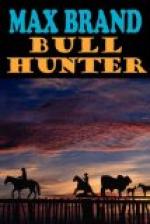As a king about to die he looked at his heirs and found them strong and sufficient and pleasing to the eye. Nowhere in the mountains were there two boys as tall, as straight, as deadly with rifle and revolver, as fierce, as relentless, as these two boys of his. He had sharpened their tempers, and he rejoiced in the sullen ferocity with which they looked at him now, unloving, cunning, biding their time and finding that it had almost come. But he was not yet done. His body was wrecked; there remained his mind, and they would find it a great power. But he did not talk until the lights had been put out and the three youths were in their separate bunks. Then, without the light to show them his helpless body, in the darkness, which would give his mind a freer play, he began to tell his story.
It was a long narrative. Far back in the years he had prospected with a youth named Pete Reeve. They had located a claim and they had gone to town together to celebrate. In the celebration he had drunk with Reeve till the boy stupefied. Then he had induced Reeve to gamble for his share of the claim and had won it. Afterward Pete swore to be even with him. But the years had gone by without another meeting of the men.
Only today, riding through the mountains, he had come on a dried-up wisp of a man with long, iron-gray hair, a sharp, withered face, and hands like the claws of a bird. He rode a fine bay gelding, and had stopped Bill to ask some questions about the region above the timberline because he was drifting south and intended to cross the summits. Bill had described the way, and suddenly, out of their talk, came the revelation of their identities—the one was Bill Campbell, the other was Pete Reeve.
At this point in the story Bull heaved himself slowly, softly up on one arm to listen. He was beginning to get the full sense of the words for the first time. This narrative was like a book done in a commoner language.
CHAPTER 4
The tale halted. To be defeated is one thing; to be forced to confess defeat is another. Uncle Bill determined on the bitterer alternative.
“He made a clean fight,” declared Uncle Bill. “First he cussed me out proper. Then he went for his gat and he beat me to the draw. They ain’t no disgrace to that. You’ll learn pretty soon that anybody might get beaten sooner or later—if he fights enough men. And my gun hung in the leather. Before I got it on him he’d shot me clean through the right shoulder—a placed shot, boys. He wanted to land me there. It tumbled me off my hoss. I rolled away and tried to get to my gun that had fallen on the ground. He shot me ag’in through the leg and stopped me.
“Then he got off his hoss and fixed up the wounds. He done a good job, as you seen. ‘Bill’ says he, ’you ain’t dead; you’re worse’n dead. That right arm of yours is going to be stiff the rest of your days. You’re a one-armed man from now on, and that one arm is the worst you got.’




